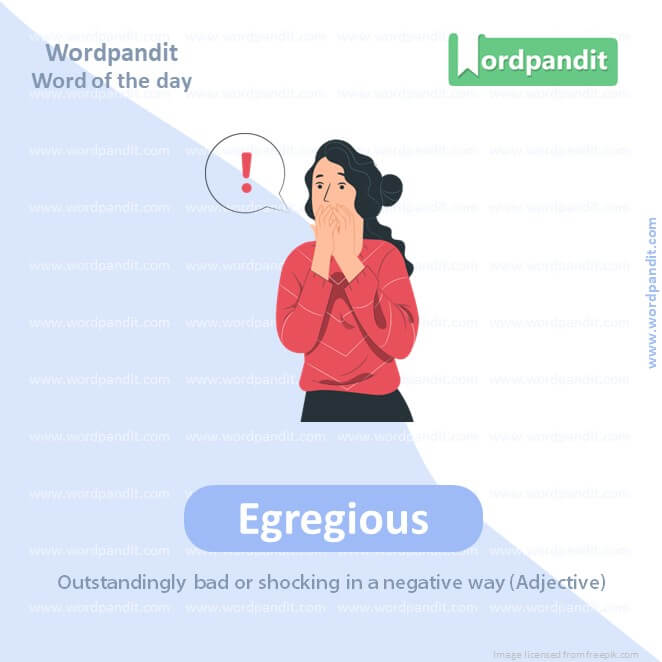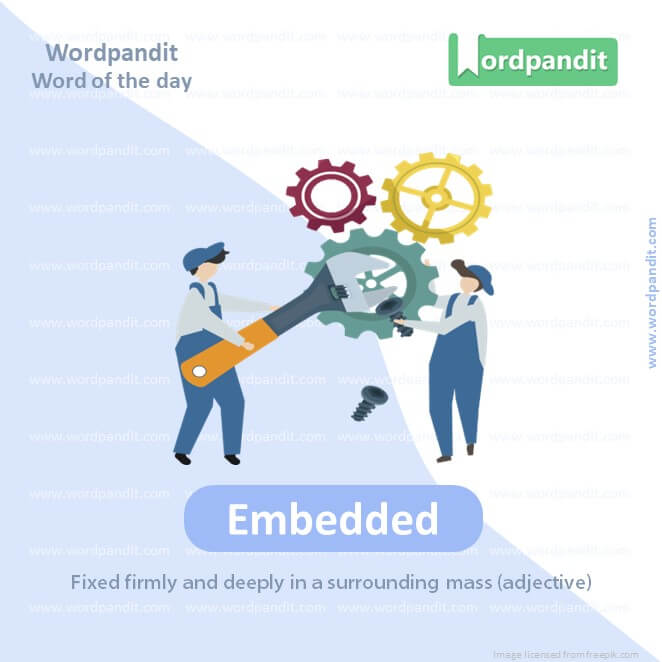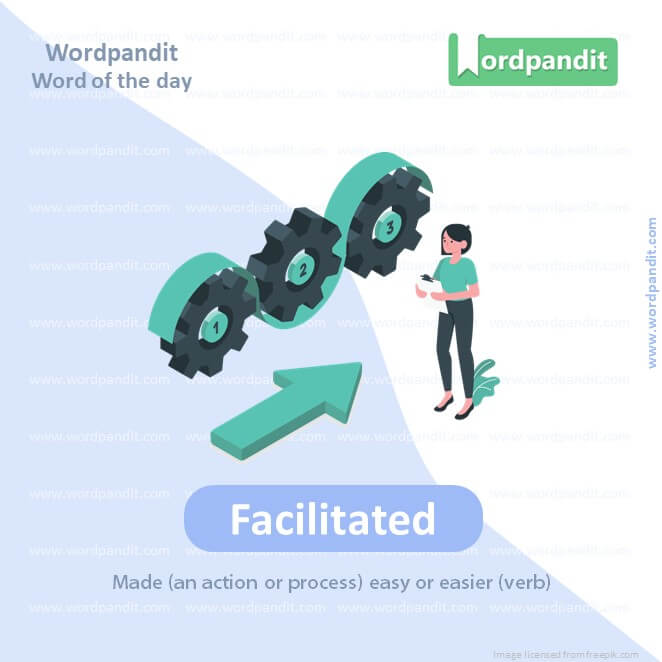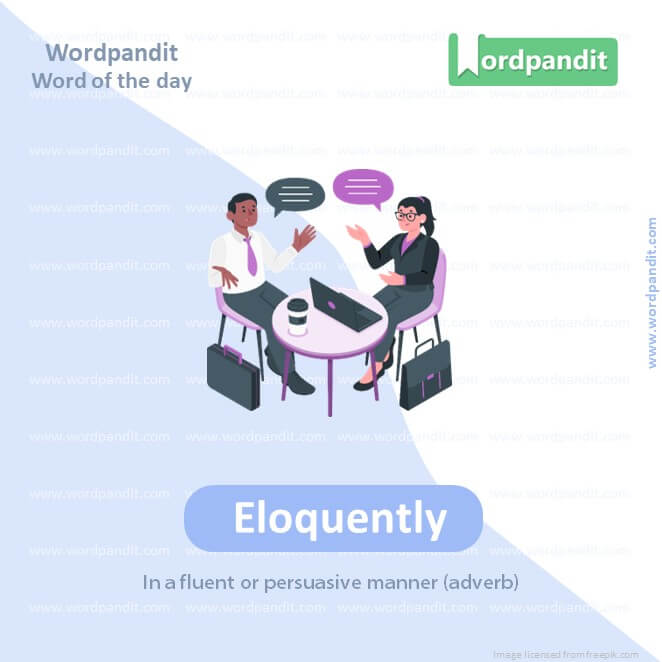Daily Vocabulary Words: List of Daily Used Words in Leading International Newspapers
Hi there. Welcome to this special section @ Wordpandit.
Our endeavour here is very simple: to highlight important daily vocabulary words, which you would come across in leading newspapers in the country. We have included the following newspapers in our selection:
• The New York Times
• The Washington Post
• Scientific American
• BBC
• The Guardian
• Psychology Today
• Wall Street Journal
• The Economist
We are putting in extensive work for developing your vocabulary. All you have got to do is be regular with this section and check out this post on a daily basis. This is your repository of words that are commonly used and essentially, we are posting a list of daily used words. Hence, this has significant practical application as it teaches you words that are used commonly in leading publications mentioned above.
Visit the website daily to learn words from leading international newspapers.

WORD-1: Egregious
CONTEXT: To the extent that most would consider the former an egregious transgression and the latter more of a lazy misstep, English would benefit from using a different term for it.
SOURCE: New york times
Explanatory Paragraph: Imagine someone doing something very, very wrong, like breaking the biggest rule in a game on purpose. “Egregious” means something is really bad or wrong beyond what’s normal. It’s like if someone cheated in a game in the biggest way possible.
Meaning: Outstandingly bad or shocking in a negative way (Adjective).
Pronunciation: ih-GREE-jus
Synonyms: Shocking, Appalling, Horrific, Atrocious, Dreadful, Outrageous, Heinous.
Usage Examples:
1. The judge described the crime as an egregious violation of the law.
2. Her behavior was egregious, causing everyone to be upset.
3. The report highlighted some egregious errors made by the company.
4. It was an egregious mistake that could not be overlooked.

WORD-2: Embedded
CONTEXT: The idea was embedded in our language as well as our culture.
SOURCE: New york times
Explanatory Paragraph: Imagine sticking a sticker on your notebook and it’s so well stuck that it becomes part of the notebook. “Embedded” means something is firmly and deeply placed into something else. It’s like when you plant a seed deep in the soil, and it starts to grow there.
Meaning: Fixed firmly and deeply in a surrounding mass (adjective).
Pronunciation: em-BED-ed
Synonyms: Imbedded, Inserted, Entrenched, Engrained, Fixed, Implanted, Ingrained.
Usage Examples:
1. The journalist was embedded with the troops to report on the conflict.
2. The splinter was deeply embedded in his finger.
3. She has values that are deeply embedded in her personality.
4. The device was embedded into the wall for security purposes.

WORD-3: Facilitated
CONTEXT: it has facilitated their discussion, condemnation and prosecution.
SOURCE: New york times
Explanatory Paragraph: Think about making a hard puzzle easier by finding the edge pieces first. “Facilitated” means helping something to happen more smoothly or easily. It’s like when someone helps you tie your shoes or opens a jar for you.
Meaning: Made (an action or process) easy or easier (verb).
Pronunciation: fuh-SIL-i-tay-tid
Synonyms: Enabled, Aided, Simplified, Assisted, Supported, Promoted, Expedited.
Usage Examples:
1. The workshop facilitated a discussion among the participants.
2. Technology has facilitated the way we access information.
3. The teacher facilitated learning by providing interactive activities.
4. The agreement facilitated trade between the two countries.
WORD-4: Fearmongering
CONTEXT: Fearmongering about drug smugglers and terrorists can work when people enter illegally.
SOURCE: New york times
Explanatory Paragraph: Imagine someone telling scary stories about monsters under the bed to make you afraid of sleeping alone. “Fearmongering” is when someone tries to make people scared for no good reason, often to get what they want by playing on those fears.
Meaning: The action of deliberately arousing public fear or alarm about a particular issue (noun).
Pronunciation: FEAR-mong-er-ing
Synonyms: Scaremongering, Alarmism, Panic-spreading, Intimidation, Terrorizing, Threatening, Frightening.
Usage Examples:
1. The politician’s speech was criticized for its fearmongering tactics.
2. Fearmongering is a common strategy in certain types of advertising.
3. He accused the media of fearmongering during the health crisis.
4. Campaigns that resort to fearmongering often aim to manipulate public opinion.
WORD-5: Dystopian
CONTEXT: I keep hoping to wake up from this dystopian tale that could have been written by Margaret Atwood.
SOURCE: New york times
Explanatory Paragraph: Imagine a world where everything is sad, and things don’t work the way they should, like if all playgrounds were never fun and always rainy. “Dystopian” describes a place or situation that is very bad or frightening, the opposite of a perfect world.
Meaning: Relating to an imagined state or society where there is great suffering or injustice (adjective).
Pronunciation: dis-TOH-pee-uhn
Synonyms: Bleak, Grim, Dark, Apocalyptic, Oppressive, Nightmarish, Desolate.
Usage Examples:
1. The novel presents a dystopian future where the earth has been ravaged by pollution.
2. In a dystopian society, freedoms and rights are often restricted.
3. Her artwork depicted a dystopian vision of the future.
4. The film explored dystopian themes of surveillance and control.

WORD-6: Eloquently
CONTEXT: As a lifelong leftist and social activist, I applaud the writers for their eloquent defense of D.E.I. However, as an advocate of academic and intellectual freedom.
SOURCE: New york times
Explanatory Paragraph: Imagine someone telling a story so well that you can see the pictures in your mind and feel the emotions. “Eloquent” means being really good at expressing ideas or feelings in a way that is very clear and powerful, like a great storyteller.
Meaning: In a fluent or persuasive manner (adverb).
Pronunciation: EL-o-kwent
Synonyms: Articulate, Expressive, Persuasive, Communicative, Fluent, Silver-tongued, Vivid.
Usage Examples:
1. The leader’s eloquently speech inspired the crowd.
2. She was known for her eloquently writing style.
3. His Eloquently defense swayed the jury.
4. The ceremony included an eloquently tribute to the honoree.
WORD-7: Emoluments
CONTEXT: The president is also covered by the foreign emoluments clause, which applies, again, to any “person holding any office of profit or trust” under the United States.
SOURCE: New york times
Explanatory Paragraph: Imagine getting a piggy bank and every time you do chores, someone puts coins in it. “Emoluments” are the rewards or money you get for doing your job or having a certain position, like getting an allowance for helping out at home.
Meaning: Profits or earnings arising from employment, office, or position (noun).
Pronunciation: ih-MOL-yuh-ments
Synonyms: Salary, Wages, Earnings, Pay, Compensation, Remuneration, Income.
Usage Examples:
1. The official’s emoluments included a salary and various allowances.
2. They discussed the emoluments package during the job interview.
3. The law prohibits public officials from receiving emoluments from foreign governments.
4. His emoluments as CEO include stock options and bonuses.
WORD-8: Disenfranchise
CONTEXT: The language of this section is so framed as to disenfranchise from office the leaders of the past rebellion as well as the leaders of any rebellion hereafter to come.
SOURCE: New york times
Explanatory Paragraph: Imagine if you were part of a club that made rules for a game, but you weren’t allowed to vote on the rules. “Disenfranchise” means taking away someone’s right to vote or have a say in important decisions. It’s like being told you can’t vote on what game the class plays.
Meaning: Deprive (someone) of the right to vote or other rights (verb).
Pronunciation: dis-EN-fran-chize
Synonyms: Disfranchise, Marginalize, Exclude, Disqualify, Strip of rights, Debar, Disempower.
Usage Examples:
1. Historical laws disenfranchised many minority groups.
2. The policy was criticized for disenfranchising the poorest members of society.
3. Efforts are underway to re-enfranchise those who have lost their voting rights.
4. Disenfranchisement can lead to significant social and political inequalities.
WORD-9: Devastated
CONTEXT: Europe’s economic recovery has lagged that of the United States. But visions of a continent devastated by immigration are fantasies.
SOURCE: New york times
Explanatory Paragraph: Imagine feeling so sad and upset, like if your balloon flew away and you couldn’t get it back. “Devastated” means feeling very, very sad or upset about something, much more than just being a little unhappy.
Meaning: Severely shocked and saddened (adjective).
Pronunciation: DEV-uh-stay-ted
Synonyms: Heartbroken, Crushed, Shattered, Overwhelmed, Distraught, Dismayed, Desolate.
Usage Examples:
1. She was devastated by the news of her friend’s illness.
2. The community was devastated after the natural disaster.
3. He felt devastated when he lost his job.
4. The devastating loss left the team in shock.

WORD-10 Frightening
CONTEXT Republican political strategy depends largely on frightening voters who are personally doing relatively well not just according to official statistics but also by their own accounts, by telling them that terrible things are happening to other people.
SOURCE: New york times
Explanatory Paragraph: Think about feeling scared when you hear a loud noise in the night. “Frightening” means something that makes you feel afraid or very scared, like when you see something unexpected or think about monsters.
Meaning: Making someone afraid or anxious; terrifying (adjective).
Pronunciation: FRYT-ning
Synonyms: Scary, Terrifying, Horrifying, Alarming, Spooky, Chilling, Dreadful.
Usage Examples:
1. The movie was so frightening that she couldn’t sleep all night.
2. It’s frightening to think about the consequences of climate change.
3. The frightening noise turned out to be just a cat knocking over a trash can.
4. He told a frightening story around the campfire.
Vocabulary Words for IELTS'
Preparing for an esteemed examination like IELTS urges a diligent focus on ‘vocabulary words for IELTS’. These specific words, frequently prominent in IELTS examinations, play a vital role in expressing ideas effectively and articulately. To successfully conquer ‘vocabulary words for IELTS’, a strategic and focused approach is quintessential.
A fundamental step when learning ‘vocabulary words for IELTS’ is understanding these words in the context of use. For this, exposure to diverse resources like newspapers, journals, academic texts, and digital content is crucial. This engagement aids in understanding the nuances of these words, fortifying your preparation for ‘vocabulary words for IELTS’.
When tackling ‘vocabulary words for IELTS’, regular practice is the cornerstone of success. Consistent writing and speaking exercises help in embedding this vocabulary in your linguistic repertoire. Take situations or topics that commonly appear in the IELTS exam and practice crafting complex yet coherent sentences using these words.
In the journey to unfold ‘vocabulary words for IELTS’, making use of memory-enhancement techniques can orchestrate your success. Tools like flashcards and recall-based applications can significantly assist in retaining and reinforcing these words in your memory. Additionally, forming personal connections or stories with these words can greatly improve word recall.
Brevity is equally significant when preparing for ‘vocabulary words for IELTS’. Attempt to learn a limited number of words each day rather than tackling a large list all at once. This habit allows the brain adequate time to absorb and store these words securely, ensuring an effective learning experience.
In conclusion, the quest to master ‘vocabulary words for IELTS’ is an engaging dance of comprehension, practice, memory techniques, and thoughtful pacing. As you pirouette gracefully through these strategies, you’ll find communicating your IELTS responses with the right ‘vocabulary words for IELTS’ is less of a cliffhanger and more of an epic tale of language success.






